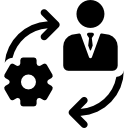Getting requirements from stakeholders

Understanding what your users want is very important. Your goal is to build software which meets the needs of users. There are different, complementary ways of gathering information from stakeholders. Different ways of collecting information can include surveys, interviews, direct observations, prototyping, and RFP's. You should understand each method for gathering requirements provides a different view (or lens, if you will) of client requirements. It is critical you understand the requirements prior to building a system.
SL version[edit]
| Method | Definition | Advantages | Disadvantages |
| Surveys (questionnaires) | A survey is a list of questions aimed at extracting specific data from a particular group of people [2] | You can easily reach many people, good to reach people in remote locations | provides less information than direct contact or interviews. Interpreting the meaning of a question or answer can be difficult. |
| Interviews | define | a | d |
| Direct observations | define | adv | disa |
| Prototyping | define | adv | disad |
| RFP's | define | adv | disad |
HL version[edit]
In addition to the above material, you should understand the idea of senior user. A senior user:
- Uses a projects specialist products to realise their benefits
- Operates, maintains or supports the project's outputs
- Is otherwise impacted by a project's products
Real-world practical advice[edit]
You should always be nervous when there is more than one person in charge of a project. We call this double-headed management, and it is very dangerous because you may get two very different specifications about the system. It is always a good idea to have only one single person who describes what a system should do. In project management, we call this a "senior customer" or a "senior user".
Do you understand this material?[edit]
Imagine you are the chief information officer for a company. The company wants to plan a system that keeps track of employees, their birthdays, salaries, and date the employee was hired. What are ten questions you would ask as you plan this system? It may be helpful to review this wikipedia entry which discusses context analysis.
Please consider the following examples, and answer the questions:
Example 1[edit]
This is a simple example:
A small business wants to plan a new system. The new system is a computer kiosk inside the store which allows customers to sign up for a email newsletter. If a custmer signs up for a newsletter inside the store, they will get a 10% discount on their first purchase at the store. The owner hopes this 10% discount will be an incentive for customers to sign up for the email newsletter. The business will then regularly email the customers special offers and savings. The business owner expects to benefit from this system by having increased sales. The customers expect to benefit from this system by having access to special offers, to save money, and to see what is new and trendy at their store.
Question 1: List the stakeholders we should consult when planning this new system. Be careful, as there is a hidden stakeholder group that is not mentioned here!
Question 2: Infer from the example what questions should be asked of each stakeholder group.
Do you have an advanced understanding of this material?[edit]
Example 2[edit]
This is a complex example:
A school of 900 students wants to plan a new system. The school hopes the new system is a secure web-based application which manages attendance data. The school administrators want to carefully track attendance for the students so it can identify when students have been absent for a customizable threshold. For example, the school might set a threshold of 5 absences within 30 days, which then automatically notifies the student, parent, and teacher there is a problem with attendance. The threshold might be 3 times within 10 days, or something like that. The system should keep track of attendance and tardies. The system should have customizable attendance codes. For example, "abscence for school trip", "excused abscence", "medical abscence" are all allowed abscence codes.
School administrators expect to benefit by having data about attendance so they can support students and parents to be in school. School administrators also expect to benefit by giving parents and students information about attendance (so parents can support their children to be in school). Finally, school adinistrators expect to benefit by using attendance data to apply for government funding (as they can prove how many students were in class on a specific day).
Parents expect to benefit by knowing when their children are in school or miss school. This way parents can support their children to be in school. Being in school is a shared value that the school hopes the parents share.
Students expect to benefit by understanding how many days of school of they have missed. The school expects students to have a strong "ownership of learning" and manage their attendance.
Question 1: List the stakeholders we should consult when planning this new system. Be careful, as there is a hidden stakeholder group that is not mentioned here!
Question 2: Infer from the example what questions should be asked of each stakeholder group.
Standards[edit]
- Identify the context for which a new system is planned. Level 2
- Identify the relevant stakeholders when planning a new system. Level 2